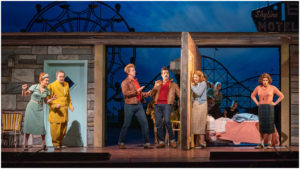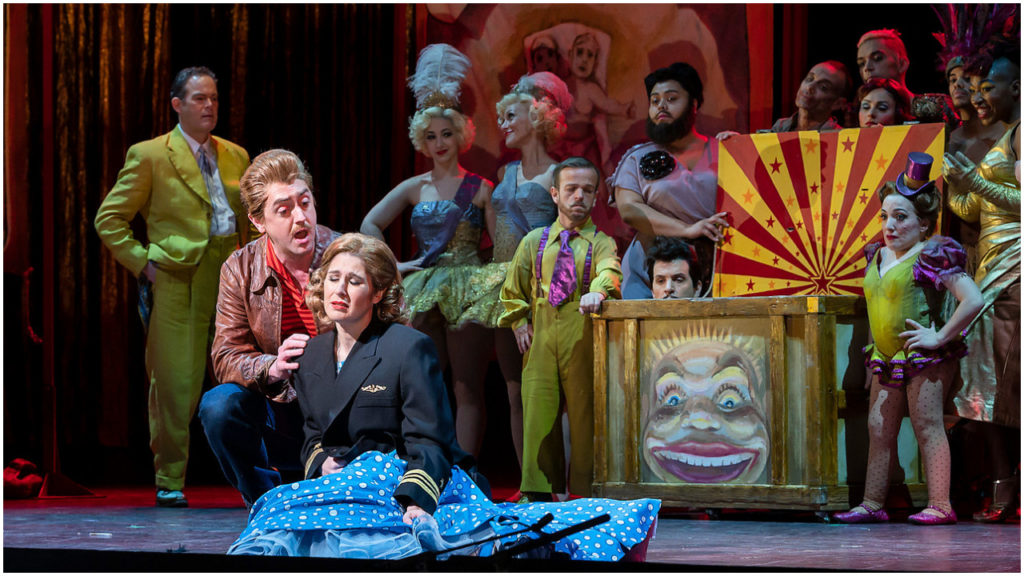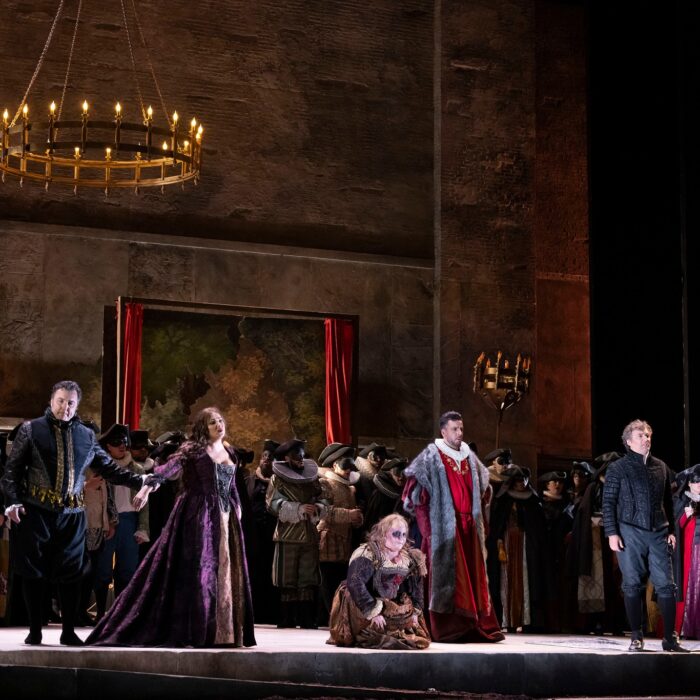
Metropolitan Opera 2019-20 Review: Così Fan Tutte
Cast Brings Love and Laughter to Coney Island Setting
By Logan Martell(Credit: Richard Termine / Metropolitan Opera)
On Feb. 15, 2020, the Metropolitan Opera raised the curtain on this season’s run of Mozart’s “Così Fan Tutte.” Phelim McDermott’s dazzling Coney Island production added a large amount of spectacle to what is the least staged of the operas born from the partnership of Mozart and Da Ponte. The afternoon saw a solid cast of artists, under the baton of Harry Bicket, bare their musical and comedic talents to deliver a delightful performance.
An Amusing Take
While an unconventional choice for locale, the seaside amusement park of the set casted the unfolding drama as a sort of romantic roller-coaster ride; its spinning doors, changing structures, or even simply the curtain, also gave the audience a view into the behind-the-scenes efforts of Don Alfonso in masterminding the events of the opera. One early example came when Ferrando and Gugliemlo depart, while the tearful farewell of the lovers plays in the foreground, we see Alfonso gather and direct a crowd of sailors and women to bolster his deception. Not long after, during the initial attempt of the disguised lovers to seduce Fiordiligi and Dorabella, the set turned about frequently as characters poured in and out of the hotel rooms, when the turning building split the stage into left and right halves, we see the skills ensemble watching the chaos from a huddle in the background.
Comprised of a number of carnival performers, such as sword-swallowers, fire-eaters, snake-charmers, and more, the skills ensemble served as not only one eye-catching aspect of this production, but the hands and feet of Don Alfonso in readying his plans as well as the set. Their roster made for a wide array of faces to silently comment on the unfolding events; while mostly working in a close-knit unity, Act two’s garden scene saw them briefly bare their respective talents before the audience and the fascinated sisters.
The Conspirators
In the role of Don Alfonso, Gerald Finley excelled in driving the events of the opera forward, seeming to be in control even through the constant bumps in the road as he set out to prove the fallibility of the heart. After a firm and confident opening scene with Luca Pisaroni and Ben Bliss, Finley approached the women with a weeping demeanor to break the false news of their lovers’ being drafted, humorously kicking off his plan with little subtlety. His trio with Nicole Car and Serena Malfi, “Soave sia il vento,” saw their despondent phrases underscored by his deep, comforting tones, the certainty of which hinted at his savvier nature as the brains behind the plot. This transitioned nicely with the falling curtain as Finley stepped forward for his arioso “Oh poverini, per femmina giocare cento zucchini?”
His relationship with Heidi Stober’s Despina was an arc in itself, beginning with her disgust as Alfonso sought her aid. Later scenes saw the two conspirators in interactions such as laughing together on a bed, or Despina grabbing Alfonso’s collar, inches away from his face, when asserting her ability to persuade her ladies toward their new lovers. Stober and Finley’s chemistry also helped them take the lead when they had to, such as Act two’s quartet “La mano a me date,” where they each spoke on behalf of the dumbfounded lovers.
As Despina, Heidi Stober carried herself with a fiery, magnetic energy that shone through the character’s many desires and disguises. Her initial aria “In uomini, in soldati, sperare fedelta?” quickly established her upbeat yet jaded character while lightening the tragic air of her ladies’ sorrow. When disguised as a doctor, Stober’s pretense of knowledge was finely capped off by a series of ornaments as she displayed the magnetic therapy machine with the flourishing line “behold my latest invention.” Her Act two aria “Una donna a quindici anni,” saw her urge her ladies with a logic that seemed more convincing as Stober appealingly went through the repetitions. This Despina could be described as getting carried away in Alfonso’s plot; her later disguise as a cowboy, referred to as being a justice of the peace, seemed an unclear change from the usual priest or notary, though it was handled charmingly by Stober.
The Lovers
As Ferrando and Guglielmo, Ben Bliss and Luca Pisaroni made for a trusty duo; while their presence on stage was mostly comedic due to their disguises, complete with fake mustaches and bulges, they did not fail to flesh out a sentimental atmosphere for the more poignant moments in the opera. One early example of this came after the excitement of their initial disguised encounter with the sisters, and Pisaroni’s self-praising aria “Non siate ritrosi” was gently deescalated with the affectionate legato of Bliss’ following number “Un’aura amorosa.” Their swaggering, overly-amorous gestures often drew laughter, while keeping a lighthearted quality to their fervent pursuit.
Pisaroni’s confident bass-baritone nicely played up Guglielmo’s initial victory and successful seduction of Dorabella, as heard in their duet “Il core vi dono.” Here, his suave delivery drew from Malfi increasingly taken responses until their lockets had been exchanged. For his embittered aria “Donne mie, la fate a tanti,” Pisaroni seemed to address the audience as he voiced his frustrations with the fairer sex. As a crowd gathered in the nearby food stall, watching Guglielmo unload, they humorously dipped out of sight below the bar, taking their drinks with them. After his later gloating, Fiordiligi’s infidelity was witnessed as Pisaroni sadly peered from the crate he hid in, with his own heartbreak retaining a humorous impact.

(Photo Credit: Richard Termine / Metropolitan Opera)
Bliss deftly wielded his silky tenor through Ferrando’s more touching scenes; faced with Fiordiligi’s initial refusal and Dorabella’s unfaithfulness, his cavatina “Tradito, schernito,” rang with a fine, crestfallen timbre. This seeming defeat tinged his later duet with Car, “Fra gli amplessi,” with a desperate passion that was hard to resist, as heard from the beckoning caress he placed on the phrase “In me alone you’ll find husband, lover, and more if you wish.”
As the sisters Fiordiligi and Dorabella, Nicole Car and Serena Malfi excelled in bringing out the frantic and flirtatious aspects of the characters. Their opening duet “Ah guarda sorella,” quickly endeared the audience as Car and Malfi exchanged contrapuntal phrases with giddy warmth. This quality carried into their following recitative, where it was nicely undermined by the feigned sorrow of Don Alfonso’s entrance. Their own despair at his news saw the two diverge in their reactions; where Fiordiligi sadly fell at Guglielmo’s feet, Dorabella fumed in the corner, even comically preparing to jump off the pier before she was pulled down.
For Car’s Act one aria, “Come scoglio, she sonorously handled the alternating highs and lows of the phrases; while her attention was initially on her own pursuer, she also kept Malfi close by pulling her away from the disguised Guglielmo. Car maintained her support as the women were chased inside. Later in Act two, despite repelling Ferrando again, we see how Fiordiligi has begun to be affected in her aria “Per pieta, ben mio, perdona.” The dizzying nature of her situation was interestingly reinforced by her ride on the merry-go-round, which circled slowly through the aria’s round form as she tried to reaffirm her conflicted heart.
Malfi used her smoldering mezzosoprano to fuel her interpretation of the fierier sister. This was nicely felt in her Act one aria “Smanie implacabili” where her romantic grief was expressed through fierce imagery at a quick tempo appropriate for her venting. After giving in to the disguised Guglielmo, Malfi carried herself with a newfound, almost-sensual flare that worked wonderfully for her Act two aria “E amore un ladroncello.” Here Malfi indulged in her new romance, expounding these feelings to the skills ensemble which flanked her, adding an air of luxury as they rolled her offstage.
The afternoon’s cast handled the almost-constant action wonderfully as they tackled surprise after surprise, working towards a joyous conclusion. The carnival staging provided a surprisingly-appropriate setting for the hectic events of the opera; its artificiality, much like the plot of Don Alfonso serves a greater purpose that goes beyond the dazzle and allure of its surface, and it’s there that the actors drew the most of the laughter and nuance that shone through Saturday’s performance.
Categories
News


